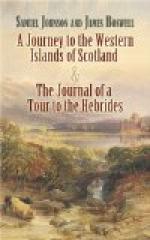Yet what the Romans did to other nations, was in a great degree done by Cromwell to the Scots; he civilized them by conquest, and introduced by useful violence the arts of peace. I was told at Aberdeen that the people learned from Cromwell’s soldiers to make shoes and to plant kail.
How they lived without kail, it is not easy to guess: They cultivate hardly any other plant for common tables, and when they had not kail they probably had nothing. The numbers that go barefoot are still sufficient to shew that shoes may be spared: They are not yet considered as necessaries of life; for tall boys, not otherwise meanly dressed, run without them in the streets; and in the islands the sons of gentlemen pass several of their first years with naked feet.
I know not whether it be not peculiar to the Scots to have attained the liberal, without the manual arts, to have excelled in ornamental knowledge, and to have wanted not only the elegancies, but the conveniences of common life. Literature soon after its revival found its way to Scotland, and from the middle of the sixteenth century, almost to the middle of the seventeenth, the politer studies were very diligently pursued. The Latin poetry of Deliciae Poetarum Scotorum would have done honour to any nation, at least till the publication of May’s Supplement the English had very little to oppose.
Yet men thus ingenious and inquisitive were content to live in total ignorance of the trades by which human wants are supplied, and to supply them by the grossest means. Till the Union made them acquainted with English manners, the culture of their lands was unskilful, and their domestick life unformed; their tables were coarse as the feasts of Eskimeaux, and their houses filthy as the cottages of Hottentots.
Since they have known that their condition was capable of improvement, their progress in useful knowledge has been rapid and uniform. What remains to be done they will quickly do, and then wonder, like me, why that which was so necessary and so easy was so long delayed. But they must be for ever content to owe to the English that elegance and culture, which, if they had been vigilant and active, perhaps the English might have owed to them.
Here the appearance of life began to alter. I had seen a few women with plaids at Aberdeen; but at Inverness the Highland manners are common. There is I think a kirk, in which only the Erse language is used. There is likewise an English chapel, but meanly built, where on Sunday we saw a very decent congregation.
We were now to bid farewel to the luxury of travelling, and to enter a country upon which perhaps no wheel has ever rolled. We could indeed have used our post-chaise one day longer, along the military road to Fort Augustus, but we could have hired no horses beyond Inverness, and we were not so sparing of ourselves, as to lead them, merely that we might have one day longer the indulgence of a carriage.




